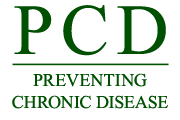PCD News Summary for June 1, 2017

Notice to News Media – PCD Release Time and Embargo Policy:
CDC’s News Media Branch releases to reporters the PCD media packet every Tuesday afternoon between 12 and 2 pm.
Embargoed until Thursday, June 1, at 12:00 PM ET
Evaluating Healthy Corner Stores: A Survey of Assessment Tools Used in the San Francisco Bay Area, 2016
Ben Chrisinger, PhD
Postdoctoral Research Fellow
Stanford Prevention Research Center, Stanford University School of Medicine
540-604-4687
bchris@stanford.edu
How do we know healthy corner-store programs are working? Based on feedback from stakeholders in the nine-county San Francisco Bay Area, researchers collected and compared corner-store evaluation tools used across the region and found that a variety of quantitative and qualitative measures are being used, ranging from ad-hoc surveys to validated instruments. Investigation of assessment tools used to evaluate healthy-corner store programs identified important differences in the kinds of data being collected. These data included the types of food assessed, nutritional standards and definitions, and store characteristics (e.g., cleanliness, services provided, accepting food assistance programs). Stakeholders are using these findings to discuss priorities for possible regional standards. Even in a region with many healthy-corner store programs, it can be difficult to compare evaluation measures across localities without cross-jurisdiction collaboration. Collecting and synthesizing measures is one step toward shared regional standards.
Contrasting Trends of Smoking Cessation Status: Insights From the Stages of Change Theory Using Repeat Data From the Global Adult Tobacco Survey, Thailand (2009 and 2011) and Turkey (2008 and 2012)
Joel London
Health Communications Specialist
Office on Smoking and Health
(770) 488-5439
Izl4@cdc.gov
In a study of adult Thai and Turkish smokers during 2008 to 2012, researchers found the number of adults committed to quitting smoking remained the same in Turkey but declined in Thailand, suggesting the importance of tailored cessation support. Two waves of data from the Global Adult Tobacco Survey, a national household survey of adults age 15 years or older, were assessed for Thailand (2009 and 2011) and Turkey (2008 and 2012). Current smokers were categorized into three stages of change based on their cessation status: precontemplation of quitting, contemplation of quitting, and preparation to quit. Nearly two-thirds of smokers in Turkey and more than two-thirds in Thailand were in the precontemplation stage during the last survey wave assessed. The number of smokers in the preparation stage increased in Turkey but declined in Thailand. Researchers note that identifying stages of cessation helps guide population-based strategies to support smokers at varying stages of change toward quitting.
###
Note: Not all articles published in PCD represent work done at CDC. In your stories, please clarify whether a study was conducted by CDC (“a CDC study”) or by another institution (“a study published by CDC”). The opinions expressed by authors contributing to PCD do not necessarily reflect the opinions of CDC or the institutions with which the authors are affiliated. PCD requests that, when possible, you include a live link to the article in your stories.
###
U.S. DEPARTMENT OF HEALTH AND HUMAN SERVICES
CDC works 24/7 protecting America’s health, safety and security. Whether diseases start at home or abroad, are curable or preventable, chronic or acute, stem from human error or deliberate attack, CDC is committed to respond to America’s most pressing health challenges.
- Page last reviewed: June 1, 2017
- Page last updated: June 1, 2017
- Content source:



 ShareCompartir
ShareCompartir